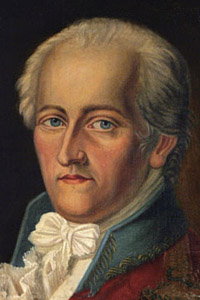Get Today in Masonic History into your Inbox. Sign up today for one of our email lists!
Need an article for your Trestleboard/Newsletter see our Use Policy
Adolph Franz Friedrich Ludwig Knigge Passes Away

Today in Masonic History Adolph Franz Friedrich Ludwig Knigge passes away in 1796.
Adolph Franz Friedrich Ludwig Knigge was a German writer and leading member of the Illuminati.
Knigge was born in Bredenbeck, Germany on October 16, 1752. At the age of 11 his mother passed away and at the age of 14 his father passed away. This left Knigge with massive debts. His creditors took the family property and left young Knigge with a modest pension of 500 thalers, a German silver coin. He studied law from 1769 until 1772 in Göttingen, a University city in Lower Saxony.
In 1772, Knigge held the position of Court Squire, at the time this was potentially a position of influence. The position was similar to a private or personal secretary to the monarch. He was also Assessor of the War and Domains Exchequer. In 1777 he became Chamberlain at the Weimar court.
In 1780, Knigge joined Adam Weishaupt's Illuminati. Knigge's work gave the fledgling organization a great deal of publicity. By 1783, Weishaupt and Knigge became disenchanted with each other and dissension rose between them. In 1784, Knigge fully withdrew from the Illuminati. Knigge lashed out at Weishaupt calling him a "Jesuit in disguise." Later Knigge said of Weishaupt "And was I to labor under his banner for mankind, to lead men under the yoke of so stiff-necked a fellow?—Never!"
In Germany, Knigge is best remembered for his book Über den Umgang mit Menschen (On Human Relations). The book has the reputation of being the authoritative guide to behavior, politeness, and etiquette. The book itself is actually more of a sociological and philosophical treatise on the basis of human relations, rather than a how to guide of etiquette. In Germany the word "Knigge" has come to mean "good manners" or books on etiquette.
Due to Knigge's involvement with the Illuminati, his fight for human rights and a prolonged period of illness caused him to lose his fortune. In 1790 he secured a position helping sustain him for the remainder of his life. He passed away on May 6th, 1796 in Bremen.
Anecdotal evidence leads people to believe Knigge is a mason. It appears if he was initiated into the fraternity it was in Kassel in 1772. This is largely believed to be the case due to a correspondence he sent to Prince Charles of Hesse when he referred to the degrees of masonry as "absurd, juggling tricks."
Knigge did write several books on the topic of Freemasonry. The titles included On the Jesuits, Freemasons and Rosicrucians, Essay on Freemasonry, Contribution Towards the Latest History of the Order of Freemasons and his final masonic work Philo's Final Declaration published in 1788.
This article provided by Brother Eric C. Steele.

